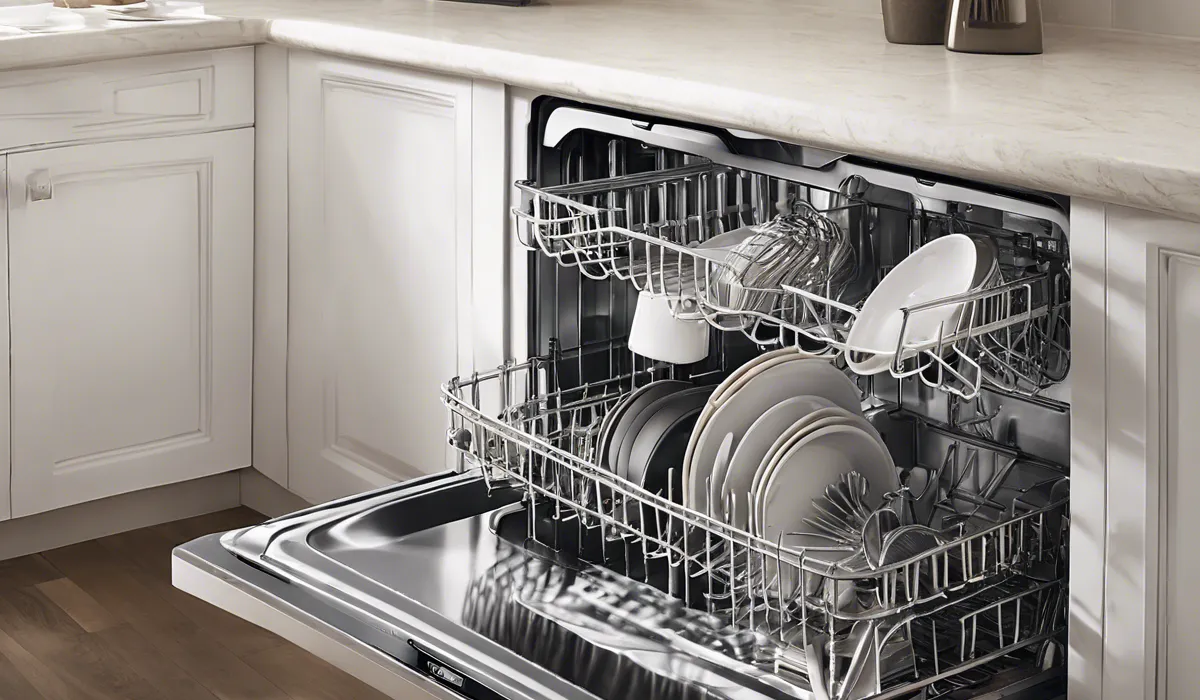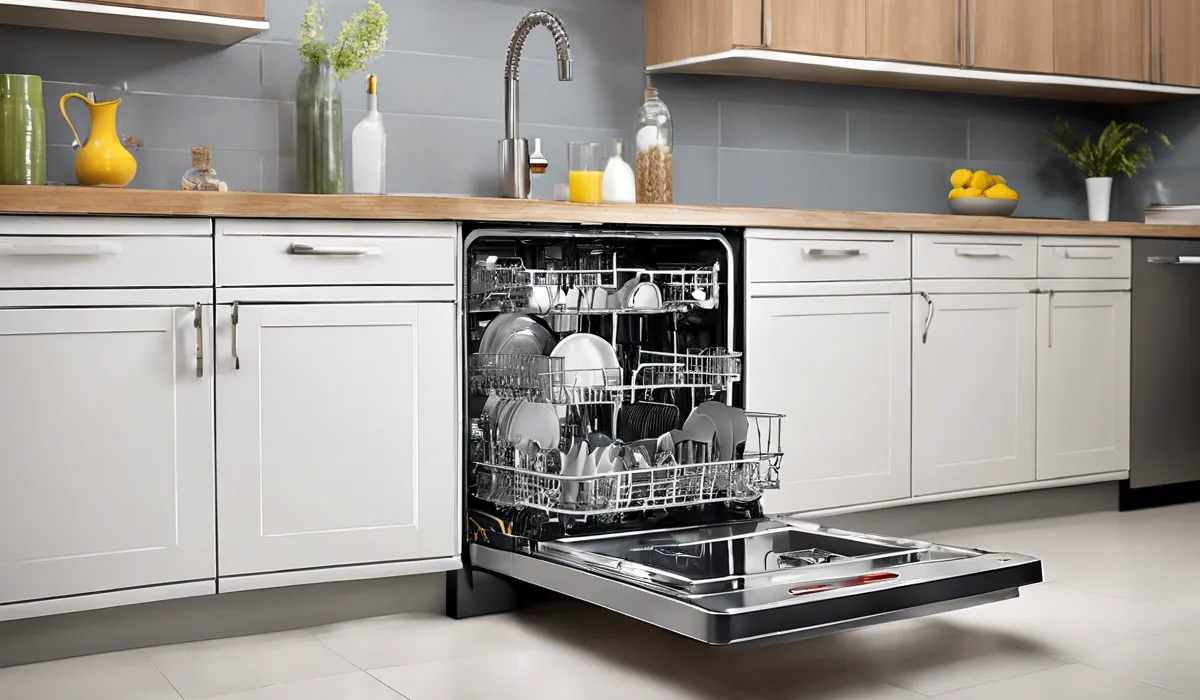Why Does My New Dishwasher Smell? Uncover the Hidden Causes!
New dishwashers may smell due to manufacturing oils, residues, or plastic components heating up initially. Running a hot water cycle with vinegar can help eliminate odors. Ensure proper installation and drainage to prevent odor-causing food buildup or water stagnation.
Causes of New Dishwasher Smells

Manufacturing Residues and Chemicals
When you first use your new dishwasher, you might notice an unusual smell. This is often due to the manufacturing process.
Factories use various oils and chemicals to ensure that the machine parts move smoothly and are protected during shipping.
While these substances are helpful for preserving your dishwasher until it reaches your home, they can leave behind a scent that is noticeable upon first use.
Additionally, the manufacturing process can leave residues on dishwasher components. These residues might emit odors when the dishwasher heats up for the first time.
The smell is typically a byproduct of these substances breaking down and should dissipate after a few uses.
Bacteria and Mold from Residual Moisture
Even new dishwashers can be subject to bacteria and mold growth. During the manufacturing, testing, or storing phases, moisture can get trapped inside the dishwasher.
If the dishwasher is stored in a humid environment before installation, this moisture can create the perfect breeding ground for mold and bacteria, which can contribute to unpleasant odors.
It is also possible for small amounts of water to remain in the dishwasher after factory testing. If not properly dried or ventilated, these droplets can lead to smells associated with dampness and mildew.
Plastic and Insulation Heating During Initial Use
Many dishwashers contain plastic components and insulation materials that protect the appliance from heat and noise.
During the first few cycles, these materials may heat up and emit a distinct odor. This is typically not a cause for concern, as the smell should fade after the dishwasher has been used a few times.
The heating element in your dishwasher can also cause smells as it warms up the plastic and insulation for the first time. This is a normal part of the break-in process for new appliances.
Preventive Measures to Avoid Odors

Running a Cleaning Cycle Before First Use
One of the most effective ways to prevent odors in your new dishwasher is to run a cleaning cycle before loading it with dishes.
Use a cup of white vinegar placed on the top rack and run the dishwasher at the highest temperature. The vinegar works as a natural deodorizer, helping to remove any manufacturing oils or residues inside the dishwasher.
Proper Installation and Ventilation
Ensuring that your dishwasher is correctly installed is essential for preventing odors. The dishwasher should be level and securely fastened to prevent any water from pooling and causing mold growth.
Proper ventilation also plays a critical role in keeping your dishwasher smelling fresh. Make sure that the dishwasher is not tightly enclosed and that there is adequate airflow around the appliance.
Regular Maintenance and Cleaning Tips
To keep odors at bay, it’s important to clean your dishwasher regularly. This includes wiping down the door seals, removing and rinsing the filter, and using a dishwasher cleaner or baking soda to clean the interior.
Regular maintenance will help prevent food particles from decaying and causing bad smells.
Additionally, always scrape off large food particles before loading dishes and keep the spray arms unobstructed to ensure effective cleaning and rinsing.
Troubleshooting and Solutions for Persistent Smells

Checking and Cleaning the Filter
If you notice an ongoing odor from your dishwasher, the filter may need attention. The filter collects food particles, and if not cleaned regularly, these can rot and cause persistent smells.
To clean the filter, remove it according to the manufacturer’s instructions, rinse it under hot water, and scrub gently with a soft brush if necessary.
Inspecting for Plumbing Issues
Plumbing issues can also be the source of bad dishwasher odors. Make sure the dishwasher is draining correctly.
If water is not draining properly, it can lead to unpleasant odors. Check the drain hose for kinks or clogs, and ensure that the sink’s drain is clear.
Professional Maintenance and When to Contact the Manufacturer
If you’ve tried everything and your dishwasher still smells, it may be time to call in a professional.
A trained technician can identify issues that are not immediately apparent, such as a malfunctioning component or a hidden blockage.
If your dishwasher is under warranty, contacting the manufacturer can be a good option. They can advise you on any known issues with the model and provide guidance on how to remedy the problem.
Always have your model number and purchase information on hand when contacting the manufacturer’s customer service.
FAQs About New Dishwasher Smells
Why does my new dishwasher have a bad odor?
New dishwashers may emit odors due to the presence of manufacturing oils, residues, or the initial heating of plastic components.
How can I get rid of the smell in my new dishwasher?
Running a hot water cycle with vinegar can help eliminate unpleasant odors from your new dishwasher.
Is it normal for a new dishwasher to smell?
Yes, it is normal for a new dishwasher to have a smell initially due to manufacturing processes.
Can improper installation cause my new dishwasher to smell?
Yes, improper installation and drainage can lead to odor-causing food buildup or water stagnation in your dishwasher.
Will the odor in my new dishwasher go away over time?
Typically, the initial odor in a new dishwasher will dissipate after a few uses as residues burn off and the machine is cleaned.
Final Thoughts
New dishwashers may emit odors due to residual manufacturing substances or the initial heating of plastic parts.
To mitigate these smells, run a cycle with hot water and vinegar. Additionally, correct installation and drainage are essential to avoid odors from leftover food or stagnant water in the future.





